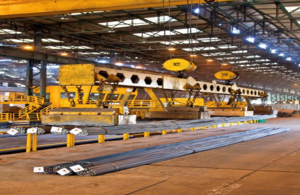TRA helps preserve critical steel supplies to the UK
The Trade Remedies Authority (TRA) has recommended changes to the tariff rate quotas (TRQs) on imports of certain steel products from Russia and Belarus.

In light of current UK sanctions on imports from Russia and Belarus, the TRA initiated a Tariff Rate Quota (TRQ) review of steel imports covered by the UK’s safeguard trade remedy measure. The TRA assessed whether the quotas for these countries should be re-allocated to avoid a potential shortage of steel in the UK. The Secretary of State for International Trade has accepted the TRA recommendation and the HMRC notice detailing the changes was published on Thursday 30 June. The tariff rate quotas (TRQs) will change from 1 July 2022.
Avoiding a shortfall in critical steel supplies to the UK
As with any safeguard measure, the UK has set quotas for different countries or regions to import a certain amount of steel tariff-free into the UK. Once their quota is exhausted, they have to pay a higher tariff rate. Russia and Belarus between them accounted for around 22% of the UK’s supply of rebar. The TRA has recommended reallocating the Russia and Belarus quota to other countries and regions including Ukraine, the EU, Turkey and Taiwan.
TRA Chief Executive Oliver Griffiths said: “We have responded to changes in the international steel market following the Russian invasion of Ukraine. Reallocating quotas currently held by Russia and Belarus will provide UK firms in the construction, engineering and automotive sectors with access to higher volumes of duty-free steel.”
What this means for importers and users of steel in the UK
There are two product categories affected by the re-allocation. Category 1 (non-alloy and other alloy hot rolled sheets and strips) are used in yellow goods, construction, tube-making and the production of downstream steel products. Category 13 (rebars) are used in construction, the automotive industry, engineering and white goods manufacture. New tariff rates may apply to imports of steel in these categories, depending on which country they come from.
Wider changes to the steel safeguards measure
The Government confirmed this week in a statement that it plans to maintain steel safeguard tariffs on 15 categories of steel imports for two further years, to 2024. The Trade Remedies Authority completed its analysis of the measure under Government direction after the work was called in by the Secretary of State for International Trade. The TRA’s final Report of Findings is available on its public file.
The TRA has also completed two further TRQ reviews related to the steel safeguard measure. These assess:
-
whether imports from developing countries exceed 3% of total UK imports, which is the threshold for developing countries to be subject to the safeguard measure
-
updates to HMRC data in relation to a small subset of steel product categories.
The TRA’s Recommendations on all three TRQ reviews are incorporated in the final TRQ allocations for the safeguard measure and are confirmed in the taxation notice which takes effect from 1 July.
Background information
-
The Trade Remedies Authority is the UK body that investigates whether trade remedies measures are needed on imports. Trade remedy investigations were carried out by the EU Commission on the UK’s behalf until the UK left the EU.
-
Safeguard measures are one of the three types of trade remedies – along with anti-dumping measures which counter goods being ‘dumped’ into countries at prices below their normal price in their country of origin and countervailing measures against countervailable subsidies – that are allowed under World Trade Organization (WTO) rules.
-
Forty-four EU trade remedies measures that were of interest to UK producers were carried across into UK law when the UK left the EU and the TRA needs to review each one to check if it is suitable for UK needs.
-
As part of this process, the TRA reviewed a safeguard measure on certain steel products, reporting its recommendation in June 2021. The TRA recommended that measures should be extended on some steel products but removed on others, where they were not needed. The TRA was subsequently asked to reconsider this decision. The reconsideration was ‘called in’ by the Secretary of State for International Trade. The TRA completed the reconsideration under her direction.
-
Tariff Rate Quotas (TRQs) are part of the World Trade Organization (WTO) framework. They specify how much of a product can be imported from a country before its imports are subject to higher tariffs. The UK’s trade remedies system follows WTO rules and is designed to make sure UK industries are not damaged by unfair trade practices or unexpected surges in imports.
-
The UK has the power to review its Tariff Rate Quotas on imports covered by safeguard measures to make sure its safeguard measures remain up to date and useful. This is not part of the reconsideration process.